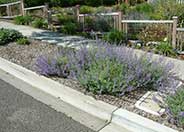
Common name:Catmint
Botanical name:Nepeta X faassenii
Nepeta faassenii makes soft, gray green, undulating mounds that are 1.5' high when blooming. The small leaves are attractive to cats. This perennial has lavender blue flowers in late spring and early summer.
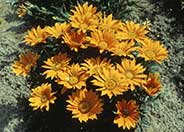
Common name:Hybrid Gazanias
Botanical name:Gazania hybrids
These ground covers will grow less than 1' tall and have medium size, gray green leaves with gold, lavender, orange, red, yellow, or white flowers that are present all year.
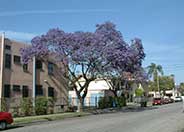
Common name:Jacaranda
Botanical name:Jacaranda mimosifolia
This irregular to rounded deciduous tree will reach about 40' tall and has fine, compound green leaves with blue flowers. Jacaranda's main blooming season is in spring and summer, but it will often produce sporadic blooms in fall as well.
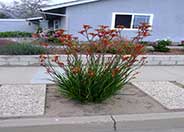
Common name:Red Cross Kangaroo Paws
Botanical name:Anigozanthos 'Red Cross'
Red Cross Kangaroo Paws has showy, tall (4'-5'), multi- branched stems with rich red color on both flowers and stems. The flowers have a green interior. It is fast growing.
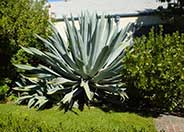
Common name:Century Plant, Maguey
Botanical name:Agave americana
This plant is fast growing to about 6'-10' tall and 8'-13' wide. Wide gray leaves have stiff terminal spines and recurved teeth on margins. It prefers full sun and well-drained situations. After blooming, which could take several years, it will die but will send up new pups from around the base. Some people are allergic to the sap. Removal is difficult if unwanted.
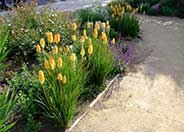
Common name:Torch Lily
Botanical name:Kniphofia hybrids
This perennial will grow to about 6' tall and has large green leaves with red, orange, and yellow flowers that bloom in spring, summer, and fall.
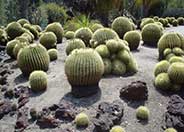
Common name:Golden Barrel Cactus
Botanical name:Echinocactus grusonii
Golden Barrel Cactus has a globe shaped trunk and vertical ribs lined with thick rows of golden spines. It grows slowly to 3' tall. It looks handsome in containers. It can thrive in full sun but prefers some shade in low desert. This cactus prefers well drained soil and rots with poor drainage.
Designer: Blooming Gardens
Photographer: GardenSoft
Incorporate compost 6" into your soil to retain water, reduce compaction, feed earthworms, and provide valuable nutrients to your plants.
Drip and other smart irrigation delivers water directly to roots, allowing no excess water for weeds.